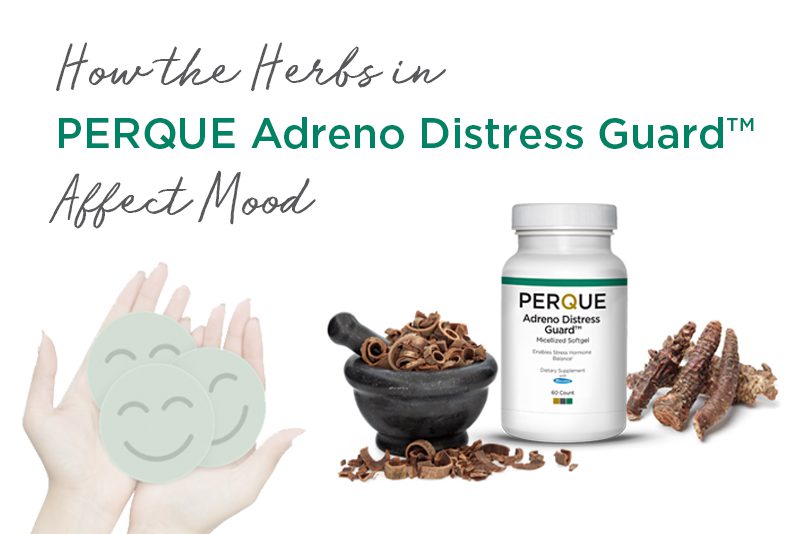PERQUE Adreno Distress Guard™ is a natural, non-stimulating product that effectively rehabilitates the body’s energy system at the cellular level. With its combination of three adaptogenic herbs (Rhodiola rosea, Magnolia officinalis, and Phellodendron amurense), it supports the rehabilitation of hormones such as adrenaline and control molecules such as cortisol. One interesting benefit of this trophorestorative repair is a positive effect on one’s emotional state. Let’s take a deeper look into how these adaptogenic herbs might affect mood.
Rhodiola rosea
Rhodiola, an adaptogenic herb, can have a positive impact on mood and emotional well-being through several mechanisms:
- Serotonin and Norepinephrine Regulation: Rhodiola is believed to modulate the levels of certain neurotransmitters, such as serotonin and norepinephrine. These neurotransmitters are closely associated with mood regulation. By balancing their levels, rhodiola may help improve mood and reduce symptoms of anxiety and depression.
- Stress Reduction: One of the primary ways rhodiola affects mood is by reducing the body’s response to stress. When you are under stress, your body releases stress hormones like cortisol, which can have a negative impact on mood. Rhodiola has been shown to help regulate cortisol levels, preventing them from becoming too high, which can help reduce stress and anxiety.
- Energy and Fatigue Reduction: Rhodiola is known to combat fatigue and increase energy levels. When you’re less fatigued, you’re more likely to have a better mood and greater overall well-being.
- Cognitive Enhancement: Rhodiola may enhance cognitive function, which can indirectly affect mood. When you can think clearly, concentrate, and remember things more effectively, you may feel less frustrated and anxious, leading to an improved mood.
- Neuroprotection: Some research suggests that rhodiola may have neuroprotective effects, which means it can help protect nerve cells from damage. This neuroprotection may contribute to mood stabilization and emotional well-being.
The combination of the adaptogenic herbs Magnolia officinalis and Phellodendron amurense, as seen in PERQUE Adreno Distress Guard™, reduces the stress hormone cortisol and supports GABA, which is an important, calming neurotransmitter. The beneficial effects include reduced stress-related eating (helpful weight loss), lowered fatigue, improved mood states, and higher energy.
Magnolia officinalis
Magnolia officinalis, a traditional Chinese medicinal herb, has gained attention for its potential effects on mood and stress. The primary active compounds in Magnolia officinalis are honokiol and magnolol, which have been studied for their impact on the central nervous system. While research is ongoing and more comprehensive studies are needed, here are some potential effects of Magnolia officinalis on mood:
- Anxiolytic (Anxiety-Reducing) Effects: Some studies suggest that honokiol and magnolol may have anxiolytic properties. These compounds are believed to interact with receptors in the brain, including GABA receptors, which can have a calming effect and reduce anxiety. This could contribute to an improvement in mood, as anxiety and stress often affect overall emotional well-being.
- Antidepressant Potential: Preliminary research has indicated that Magnolia officinalis may have antidepressant properties. It may influence various neurotransmitters and signaling pathways in the brain associated with mood regulation, including serotonin, dopamine, and norepinephrine. These effects could lead to improvements in depressive symptoms, and mood stabilization.
- Neuroprotection: Magnolia officinalis, and especially honokiol, have been studied for their potential neuroprotective effects. Protecting nerve cells from damage and inflammation can be crucial in maintaining healthy brain function and preventing mood disorders.
- Anti-Inflammatory Effects: Chronic inflammation has been linked to mood disorders, including depression. Magnolia officinalis, through its compounds like honokiol, has demonstrated anti-inflammatory properties that may help mitigate inflammation in the brain, which can indirectly contribute to mood improvement.
- Stress Reduction: Magnolia officinalis, through its potential influence on the hypothalamic-pituitary-adrenal (HPA) axis, may help regulate the body’s stress response. This regulation could lead to lower stress levels and, in turn, a better mood.
- Sleep Improvement: By reducing stress and anxiety, Magnolia officinalis might indirectly improve sleep quality. Better sleep can have a significant impact on mood and overall emotional well-being.
As with any natural remedy or supplement, individual responses may vary, and it’s important to consult with a healthcare professional before using Magnolia officinalis or any related product, especially if you have an existing medical condition or are taking other medications.
Phellodendron amurense
Phellodendron amurense, also known as Amur cork tree or Huang Bai in traditional Chinese medicine, is often used for its potential health benefits, including mood-related effects. The primary bioactive compounds in Phellodendron amurense are berberine and palmatine, and while research is ongoing, there is some evidence to suggest potential effects on mood:
- Anxiolytic (Anxiety-Reducing) Properties: Phellodendron amurense, specifically its berberine content, has been studied for its potential anxiolytic effects. Berberine may interact with neurotransmitter systems and receptors in the brain, including the serotonin system, which is involved in mood regulation. By reducing anxiety, Phellodendron amurense could indirectly contribute to an improvement in mood.
- Stress Reduction: Berberine, found in Phellodendron amurense, may help modulate the body’s stress response. This could lead to lower stress levels and, subsequently, a more positive mood.
- Anti-Inflammatory Effects: Chronic inflammation has been linked to mood disorders, such as depression. Some research suggests that berberine may have anti-inflammatory properties, which could contribute to mood improvement.
- Neuroprotection: Phellodendron amurense has also been investigated for its potential neuroprotective effects, which might help protect nerve cells and support cognitive function, indirectly influencing mood.
The mood-enhancing effects of these herbs can vary from person to person. Some individuals may experience a more pronounced mood improvement, while others may not notice any significant change. The effectiveness may depend on factors such as the individual’s baseline mood, the specific cause of their mood disturbances, and the dosage of herbs used. The herbs in PERQUE Adreno Distress Guard are adaptogenic, meaning they strive to work together with the body’s natural mechanisms to manage both mental and physical hormonal response to stress. However, healthcare providers should be consulted for serious mood-related concerns.
Did you enjoy this post? We post new content regularly! Click here to see our latest blog posts.





